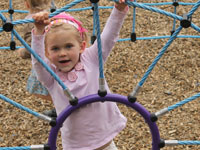
The child also has to problem solve, concentrate, explore, use their imagination and discover how they reach their goal and hide from the adults.
These days we are more and more worried about safety, accidents and managing risk. Obviously safety is the number-one priority when it comes to a child playing on challenging play equipment; under correct supervision it encourages children to assess and manage risk for themselves, and this is a very important skill for the rest of their lives.
When a child achieves something that they thought they would not be able to do, it gives them such a sense of achievement and confidence to try challenge themselves in the future, this will boost there self-esteem and confidence – at the same time they will learn about the consequences of undertaking more challenging tasks.
Playground equipment has developed a stigma of being boring and unchallenging over the years. A quick look at a few catalogues from reputable suppliers shows there is a much wider range of equipment than was the case 10 years ago. Manufacturers like myself have made determined efforts to increase the play value and challenge of equipment. It is true that some equipment that had a high risk of inflicting injury has disappeared e.g. plank swings, witches’ hats. But it is equally true that innovative and challenging equipment has come on to the market, such as our Big Kahuna agility play design. As a playground designer and manufacturer we are continually working on keeping our current and future designs safe, standards compliant but still challenging. This constant race keeps the industry, designs and products competitive.
The opportunity to play creatively in high-quality environments is essential to the development of children. Through their play they acquire skills and abilities that can be learnt in no other way. Children cannot provide these opportunities for themselves – adults must do it for them. The quality of what we provide affects the quality of what children learn – the greater the complexity of that environment, the greater the quality of learning.
The safety of children on playgrounds does not depend solely upon the initial design of the site and the selection of equipment. Its continued management and the provision of high quality inspection and maintenance programmes are essential if safe opportunities for children to play creatively are to be preserved.
The New Zealand Playground safety standards (NZS 5828:2004) recommends that the owner of the playground should conduct a routine (daily or weekly) and operational (monthly) inspection on the playground, then an annual inspection should be carried out by an independent specialist. Annual inspection essentially looks at vandalism, minor and major wear, long-term structural problems, changes in standard compliance and design practice, risk assessment, etc.
Park Supplies offers a full operational and annual inspection service, please contact for more information.
A new report from the University of Auckland’s Our Voices Project asks young people what…
The government has opened a tender for new standardised assessment tests, leaving educators shocked and…
Early in her career, Kiri Turketo found inspiration in an unlikely source. In this Principal…
Real stories of dedication, challenges, and triumphs from educators in NZ. Part six comes from…
Is fast furniture impacting your school's environmental footprint? We explore eco-friendly solutions to reduce furniture…
A new report from the New Zealand Initiative argues we need a stronger and clearer…
This website uses cookies.